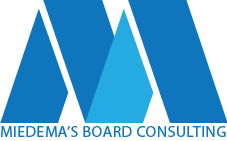A lot of work goes into finding new board members. There are nominations, resume reviews, interviews, reference checks, committee discussions and a board skills matrix to balance. By the time the new board member comes to their first meeting, the governance committee has invested countless hours in the process. For the new member the process of getting oriented is just beginning.
Too often the orientation process is reduced to being handed a stack of documents to read in the hopes that they’ll figure things out eventually. Sometimes there is even an orientation meeting where new board members “drink from a firehose” of data and information. New board members can have a lot of questions going in to their first board meeting: Why is that discussion topic so heated? Am I sensing tension between two of the board members? Who are those people sitting at the table off to the side? If this is a policy board does that mean I’m not allowed to ask certain questions or talk to the staff? What type of questions should I be asking? What am I supposed to wear – a suit or jeans? Fortunately there are a few key steps that can dramatically improve the orientation process with very little additional effort. Being assigned a mentor, having a good Board Policy Manual and creating an online portal are key parts of an orientation process that gives new members access to the information they need to get up to speed quickly.
Having a mentor for their first year is one of the best ways to orient a new member. A mentor sets the stage for a much more welcoming environment. They contact the new recruit before their first meeting to answer any questions they might have – big or small. At the first meeting they introduce the new person to staff and fellow board members and then sit beside them to help navigate through the materials, interpret the inevitable acronyms that slip into the conversation and answer questions during breaks. The reason they are assigned for a full year is to allow the time for follow-up. Many questions will come up after the first few meetings as board members absorb the information presented to them and go deeper into issues and ideas.
A Board Policy Manual is also a key part of orienting a new board member. A Board Policy Manual captures the decisions the board has made over the years, spells out clearly the foundational beliefs and values of the organization, the expectations and responsibilities of board members, the governance philosophy, the rules of engagement with the CEO and what the board expects from of the CEO. The Board Policy Manual comes with a suite of reference documents that board members need to do their job such as a copy of the by-laws, the strategic plan, the budget, organization charts, succession plans, annual work plans, compliance checklists, conflict of interest and ethics statements, committee terms of reference, meeting assessments and more. Orienting board members to their legal responsibilities reduces the risk of a decision made in ignorance.
Ideally the Board Policy Manual and any documents board members need are available online. There are many board portal options on the market or the board can use a free resource such as OneDrive, DropBox or Google Docs. This allows board members to have access to all the documents they need and quickly access the most recent version. Board meeting packages can also be put on the portal for fast and efficient distribution. No more binders to maintain or materials to courier. The portal can include practical information for new board members such as directions to the head office, the history of the organization, meeting schedules, a list of acronyms, copies of the minutes of previous meetings and the names and contact information for all the board members and senior staff.
A good orientation process not only brings the new board member up to speed faster but it is also more enjoyable for the person the board invested so much time to recruit. They will be well on their way to building good relationships with the staff and fellow board members, they will have a deeper understanding of the critical issues and they will be well equipped to govern well in an organization they are passionate about.







